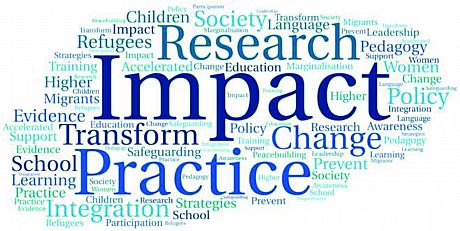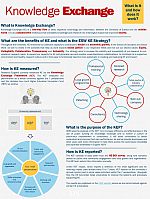Knowledge exchange and impact
Research carried out by staff in the School of Education and Social Work is making a substantial and positive impact to the lives of people globally.
 Our work is improving policy and practice for children and young people at risk of abuse, neglect, violence, exploitation, and school exclusion. Strong partnerships with practitioners and policy-makers have enabled research on educating refugees, young people’s sexual health, adults in higher education, and children in conflict-affected areas to bring about measurable change in national and international policy. Our research on safeguarding adults, supporting individuals with learning disabilities, and evaluating interventions with parents, children, and families continually shapes the innovative practices of educators and social care professionals both nationally and internationally.
Our work is improving policy and practice for children and young people at risk of abuse, neglect, violence, exploitation, and school exclusion. Strong partnerships with practitioners and policy-makers have enabled research on educating refugees, young people’s sexual health, adults in higher education, and children in conflict-affected areas to bring about measurable change in national and international policy. Our research on safeguarding adults, supporting individuals with learning disabilities, and evaluating interventions with parents, children, and families continually shapes the innovative practices of educators and social care professionals both nationally and internationally.
Planning for research impact is integral to the way in which we support academics and doctoral researchers to develop and carry out their research; discussing pathways to impact, planning and measuring impact is at the heart of our research culture.
- Knowledge Exchange Poster
-
 This knowledge exchange infographic has been adapted with permission from Nick Bull in Life Sciences as a helpful reminder of what Knowledge Exchange is, how it has come to be conceptualised in higher education, and how we as a school can use it to maximise the reach, impact, and influence of our work.
This knowledge exchange infographic has been adapted with permission from Nick Bull in Life Sciences as a helpful reminder of what Knowledge Exchange is, how it has come to be conceptualised in higher education, and how we as a school can use it to maximise the reach, impact, and influence of our work.View/download the Knowledge Exchange poster.
- Research Expertise Impact Videos
-
The following videos created by ESW researchers represent a wide range of expertise and critical thinking within the school and an investment in making research accessible to those who might benefit from it. The videos also demonstrate the School's collaborative, multi-disciplinary work and how it seeks to answer big questions which will shape future society.
- Addressing Loneliness and Isolation in Older People from Minoritised Ethnic Groups: Brenda Hayanga
Older people from minoritised ethnic groups living in the UK are more likely to experience social isolation and loneliness as a result of age/ageism, migration-related factors, health and socio-economic inequalities, and racism/discrimination. This video reports findings from a four-phased mixed-methods ESRC-funded PhD project conducted by Brenda Hayanga. The study revealed that community-based groups tailored to aspects of older minoritised people’s identities that they value, and which provide activities/opportunities to connect based on these identities, can help social isolation and loneliness in older minoritised people.
VIDEO - How to organise social services during and after a natural disaster: Reima Ana Maglajlic
This video summarises the key findings from a rapid review of the organisation and delivery of social services during and following natural disasters.
VIDEO - Navigating White Privilege - The key to achieving anti-racism in social work: Tam Cane & Karen Okuena Budd
Unravelling white privilege can help social workers appreciate and accept racial and cultural needs of ethnic minorities, their experiences and fear of discrimination. This animation from Dr Tam Chipawe Cane and Karen Okuefuna-Budd provides a brief overview of strategies that social workers can use to understand and address white privilege in the communities they serve.
VIDEO
- Addressing Loneliness and Isolation in Older People from Minoritised Ethnic Groups: Brenda Hayanga
- Understanding Research Impact
-
What is Research Impact?
There are two key definitions:
- The demonstrable contribution that excellent research makes to society and the economy.
Research Councils UK (RCUK) - Any identifiable benefit to, or positive influence on, the economy, society, public policy or services, culture, the environment or quality of life.
Higher Education Funding Council for England (HEFCE)
Research has impact if it has brought about some kind of direct change or benefit to society, or has influenced thinking or practices in a positive way. It is about the effect of academic research on those who take new knowledge into the non-academic world, for example, teachers, social workers, health practitioners, or policy makers. While conference presentations, journal papers, and books are a highly effective way of disseminating ideas to others (and can be part of a pathway to impact), communication of research findings does not usually constitute impact in its own right, but is the first stage of a process. What constitutes impact is what happens next. Summarised as follows:
- Public Engagement: Communicating the research to the relevant stakeholders so your research starts to influence the thinking of those outside academia.
- Knowledge exchange: Shaping the findings so that they generate recommendations which are relevant to the policy and practice arena – can be an important part of the process.
- Research Uptake: Persuading key stakeholders to take the research forward in their particular field, organisation, or practice. If you have managed to engage those with both high interest in the topic and high influence in the field, then they may have the resources and power to take changes in policy, services or practices forward.
- Impact Capture: Ensuring that any substantiated evidence of the changes which have resulted from the research are established and kept.
- The demonstrable contribution that excellent research makes to society and the economy.
- Impact and REF
-
For the purposes of the REF, impact is defined as an effect on, change or benefit to the economy, society, culture, public policy or services, health, the environment or quality of life, beyond academia. It is an important element of the REF assessment; case studies describing specific examples of impacts achieved during the assessment period are submitted, alongside an engagement and impact narrative.
Impact includes, but is not limited to, an effect on, change or benefit to:
- activity, attitude, awareness, behaviour, capacity, opportunity, performance, policy, practice, process or understanding
- an audience, beneficiary, community, constituency, organisation or individuals
- any geographic location whether locally, regionally, nationally or internationally.
Impacts are assessed in terms of their ‘reach and significance’, regardless of the geographic location in which they occurred - locally, regionally, nationally or internationally. The UK funding bodies expect that many impacts will contribute to the economy, society and culture within the UK, but equally value the international contribution of UK research.
Please contact Hazel Crawford (Assistant Research Manager) if you have any questions about REF and impact.
- Impact Funding
-
Over the last few years, the School has been running the Impact Quick Boost (HEIF) funding scheme. The scheme provides awards for activities that can accelerate the impact of research our academics are currently involved in. The funding is also intended to help generate new pathways to impact and/or evidence ongoing impact from research. The call goes out in the autumn. If you are interested in applying for this fund please send your expression of interest (just a few quick lines about your proposed activity and approximate budget), or any questions you might have about the funding scheme, to Professor Elaine Sharland or Hazel Crawford.
The Research Quality and Impact team provide up to date details of other research impact funding available, both internally and externally.
Please contact Hazel Crawford to talk over your ideas and help direct you to the right place.
- Useful Contacts and Support
-
There are a range of useful contacts who can help you plan for impact:
Hazel Crawford, ESW Assistant Research Manager, can signpost you to advice and support on developing your research impact ideas.
The Research Quality and Impact team have produced a research impact guidance toolkit (e.g. defining impact, planning and designing impact and building your impact story) and can also help with identifying funding, funder requirements and how to collect and store evidence.
The Elements team provide regular training on all aspects of Elements, including the impact module. Contact elements@sussex.ac.uk for more information. Bespoke workshops in ESW on the impact module are also offered from time to time (contact Hazel Crawford).
Policy@Sussex act as a bridge between University of Sussex social sciences research and policy-making organisations. Their website includes a range of useful resources to assist researchers interested in writing policy briefs, getting research presented within Parliament and contributing to select committees.
The ESRC Impact Toolkit is specifically aimed at social science researchers and offers guidance on writing pathways to impact communication strategies and public engagement activities.
The LSE Impact Blog is a lively and topical blog run by the London School of Economics geared towards social science research.
In 2016, the Government published a review of the Research Excellence Framework (the STERN Review) which made recommendations on the REF and on allocating university research funding.
Developed by Professor Mark Reed, the Fast Track Impact website provides more information, advice and resources about impact planning, engaging with stakeholders and writing impact pathway statements for funding bids.
ESW has purchased copies of The Research Impact Handbook by Mark Reed, which are available to borrow.


